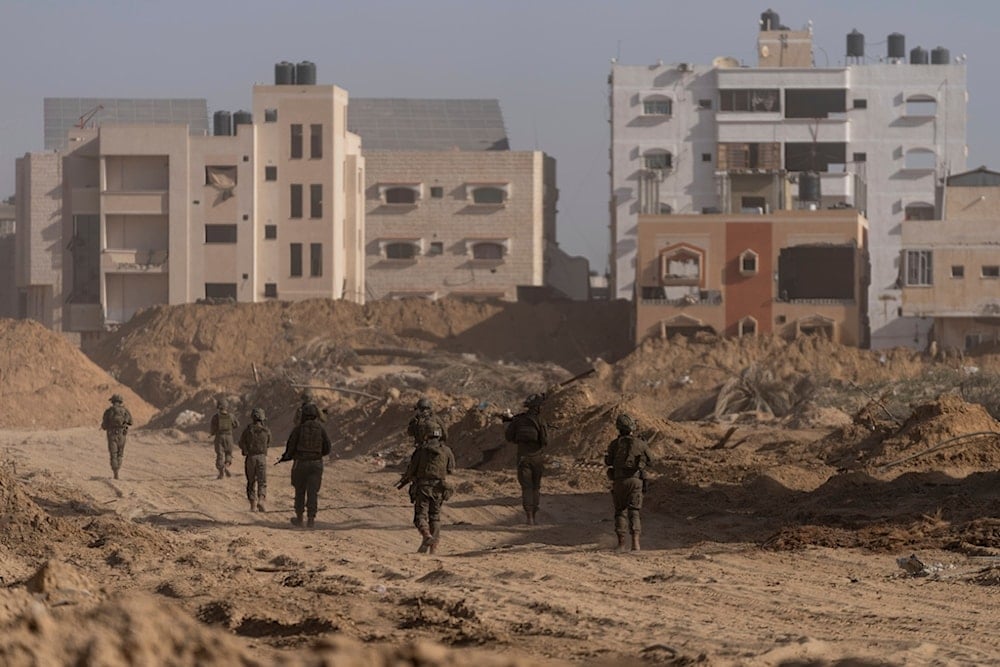'Israel' ignored chances to end wars on Gaza, Lebanon: Ex-official
Tzvika Himovitch, a former Israeli Air Defense official, highlighted the complexities of ending the Gaza war and emphasized the diminished chances of releasing captives.
-

Israeli occupation forces walk during a ground incursion in Khan Younis, Gaza Strip, Palestine, on, Jan. 10. 2024. (AP)
There is no visible change in the fighting arena in Gaza, and at the beginning of the second winter of the war, it seems that wallowing in the Gaza mud is inevitable, former Israeli occupation Air Defense official Tzvika Himovitch said Sunday.
Himovitch admitted in an interview with Israeli media outlet Israel Hayom that the opportunity to "end the war in Gaza in exchange for the release of the captives was a paramount Israeli interest, but unfortunately, it remained an untapped opportunity."
He argued that "a settlement in the north is complicated, especially regarding the mechanisms for implementing and applying the conditions insisted upon by Israel," noting that "the situation in Gaza is much more complex."
"As long as the Israeli government is not willing to discuss what comes after Hamas in Gaza, we will witness Israeli army incursions and temporary control operations in different areas of the Gaza Strip, Jabalia now—and tomorrow?, and the friction between the Israeli army and the terrorist groups will continue. The cost in terms of our soldiers' lives will increase more and more," the former Israeli official stressed.
He emphasized that without a settlement that ends the war and includes the withdrawal of Israeli forces from Gaza, the prospects of releasing the 101 captives held there have significantly diminished.
Himovitch also mentioned that a settlement in the north would allegedly temporarily halt the northern front claiming that this would allow Israeli settlers to return to their settlements.
Moreover, the Israeli occupation, the former official noted, would also have the opportunity to replenish its ranks, ease the strain on IOF reserve forces, and better prepare for future confrontations.
Regarding the ceasefire agreement in Lebanon, the former official proclaimed that "the question is not whether the agreement will be violated, but when," adding that "the most important" part of the agreement would be "testing our [Israel's] response to the first violation of the agreement by Hezbollah."
It is worth noting that the IOF official concluded that even before it is implemented, Hezbollah would violate the agreement, ignoring that violations by "Israel", known for breaching agreements and Lebanon's sovereignty, have historically been the reason for wars erupting in addition to the Israeli occupation and oppression of Palestine, Lebanon, and Syria alike.
Israeli settlers living 'endless nightmare' in north: Israeli media
Israeli media has described the situation in northern occupied Palestine as an "endless nightmare," with settlers grappling with fear, frustration, and an unbearable routine of life "between [air raid] warnings."
According to Yedioth Ahronoth journalist Roi Kais, northern settlers hear news of progress in negotiations and Israeli efforts to settle the war on Lebanon. Yet, their daily reality remains dominated by warnings and evacuations.
On Friday evening, a single drone hovering for about an hour forced tens of thousands into shelters until it exploded. The affected areas stretched from western al-Jalil, Nahariya, and Akka to the Krayot and the Carmel regions. "No one sees an end in sight," Kais remarked.
For many settlers, this has become an unbearable routine involving exchanges of fire and rockets launched from Lebanon into western al-Jalil and Haifa. A Nahariya settler, who sought shelter during Friday's sudden alarms, spoke of widespread trauma. "We're all suffering. Even the dogs now instinctively run to the shelter," he said.
"One moment, everything changes," he added. "Seven phones issued alerts simultaneously during dinner, and from there, it all begins."
Kais also highlighted the challenges of life in shelters, describing it as deeply frustrating and mentally taxing. Settlers report pressure, division, and mounting despair, with rocket shrapnel causing damage to cars and gardens.
Read more: Settlers in Haifa are now 'on front line', Nahariya became ghost town

 4 Min Read
4 Min Read








